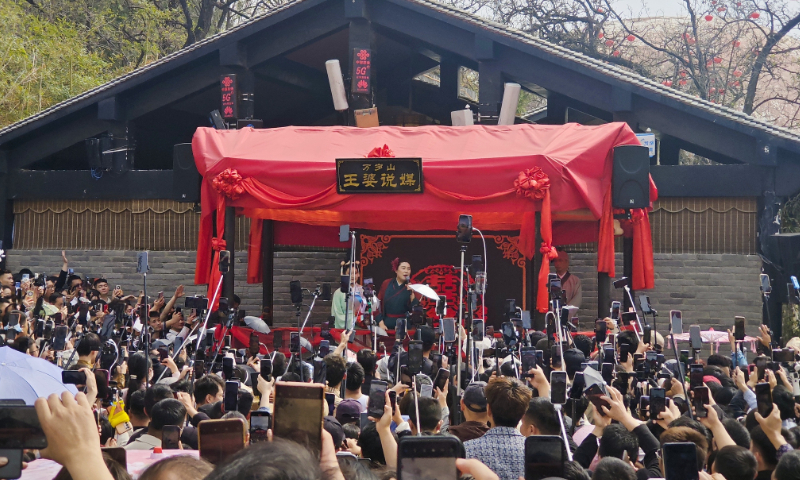Song Dynasty-style matchmaking show becomes a hit, prompting copycats to profit from 'singles economy'

The venue at Wansui Mountain Martial Arts City was packed with tourists watching "Wang Po Matchmaking" on March 30, 2024, in Kaifeng, Henan Province. Photo: VCG
Many tourist attractions across China have followed suit to provide interactive matchmaking programs, inspired by the success of a program launched at a scenic spot in Kaifeng city, Central China's Henan Province, which gained widespread attention both offline and on social media last month.
The matchmaking performance, dubbed "Wang Po Matchmaking," held daily at the scenic of Kaifeng Wansui Mountain Martial Arts City, unexpectedly went viral on Chinese social media platforms in March, significantly boosting local tourism in the city.
The performance draws inspiration from the classic Chinese novel Water Margin, which is set against the backdrop of the end of the Northern Song Dynasty (960-1127). "Wang Po," or "Granny Wang," is a classic character in the novel who has her own tea house and runs a matchmaking business.
This unique cultural performance allows tourists from all over the country to immerse themselves in the local folk culture specific to the Song Dynasty (960-1279).
To date, the performance has been viewed more than 6.54 billion times on Douyin short video platform, and related topics have been viewed more than 360 million times on Sina Weibo. Since March 15, the official account of "Kaifeng Wang Po" on Douyin has gained 6.22 million followers in just 25 days, and as of Tuesday noon, the followers hit 6.45 million, with its popularity comparable to those top internet celebrities, Shangyou News reported.
Based on videos uploaded by audiences, the venue is normally packed long before the start of the performance. The program, which was originally 10 minutes long, has also been lengthened to two hours.
During the recent Qingming Festival holidays, hotel bookings in Kaifeng increased nearly tenfold compared to last year, China Central Television (CCTV) reported. In recent days, apart from tourists from cities in Henan such as Zhengzhou, Anyang, and Jiaozuo, there were also visitors from Beijing, Xi'an, Xuzhou and other places coming specifically to watch this performance.
The high intensity of the job compelled the actress playing Wang Po to request a one-month leave starting from April 3. During this period, other actresses will continue the performance.
The scenic spot operator reminded tourists to treat the show as entertainment rather than a serious matchmaking event.
Similar offline matchmaking events have emerged in cities including Wuhan in Central China's Hubei Province, Xi'an in Northwest China's Shaanxi Province and Zhengzhou in Central China's Henan Province, attracting a large number of single young men and women to participate.
A tourist attraction in Wuhan started a similar performance on March 30 and has since registered about 500 couples for matchmaking in their database, with 30 to 40 couples registered every day on-site, and approximately 4 to 6 couples successfully matched per day.
However, a cultural park in Zhengzhou which previously launched a similar matchmaking program has decided to give up the project and turned back to original programs that also focus on the "singles economy."
The singles economy and matchmaking has become an industry in China. Some people are willing to pay up to 100,000 yuan ($13,823) for services offered by matchmaking websites, according to media report.
Meanwhile, there is a growing demand for "matchmaking corners" in cities. In addition to the renowned spontaneous matchmaking corners at Zhongshan Park in Beijing and the People's Park in Shanghai, residents from various cities are urging local governments to establish more government-organized matchmaking corners.
Reality dating TV shows, such as You Are the One, have become increasingly popular in China in recent years.
Global Times

